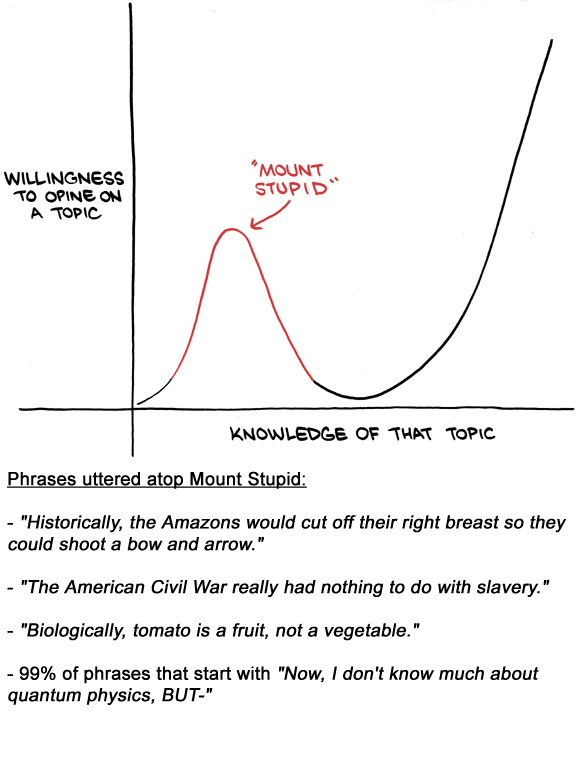Here's a stab at that rarest of things : a short blog post.
There's much going round on the internet lately about the underestimated value of luck in bringing success. In a related note, this little video describes the well-known Dunning-Kruger effect, where stupid people don't realise they're stupid (yet can nevertheless make a success of themselves), but also the reverse : clever people often make the mistake of thinking everyone else is at least as intelligent as them. Which gave me the idea, thanks to a discussion with the wonderful Paul Carr, to make the above chart.
It should be largely self-explanatory. Intelligence (or skills or knowledge of a subject, perhaps other things too) doesn't necessarily correlate with how accurately people evaluate their own intelligence. Now I've covered intelligence and stupidity in depth before, so let me just give a brief summary here. Just a couple of things to bear in mind : a) This graph doesn't show a trend - I'm not going to make any effort to say which part of the diagram people generally lie on, or how intelligence might shift them around; b) It's all relative - it's possible to be the least clever genius in a room, just as you can be the worst Olympic athlete.
1) Is It Arrogance If You're Right ?
Few things tick me off quite so much as people who loudly shout about how great they are but then turn out to actually be as good as they claim. That's the top right of the chart. These people are genuinely skilled, but not even the most devoted of Richard Dawkin's acolytes would venture to suggest him as a prime example of humility. At least with people who don't measure up to their own hype you get to laugh at them.
2) Imposters
The best lack all conviction... If you're smart and knowledgeable enough, you can evaluate pretty accurately just how much you don't know about a particular field. But this can lead to some interesting side-effects : you start to think that, because there's so much you don't understand, you're actually a bit of thicky. Imposter syndrome, in the upper left of the chart, is when people assume, therefore, that everyone else must be at least or more intelligent than them - particularly within their own field. The thing is that few people like showing their own ignorance, giving the appearance that they know and understand quite a bit more than they really do (or even think they themselves do). Hence everyone goes around the whole time thinking everyone's much smarter than them. Realising that other, respected people are feeling this way is a liberating experience.
In some situations, this peculiar variety of humility can contribute to conspiracy theories : a need to believe that there are more intelligent people than ourselves acting to control us. A more common effect is, I think, to lead to people with appalling communications skills because they assume everyone else will grasp concepts much more quickly than they did.
3) Mt Stupid
...while the worst are full of passionate intensity. Plato went on to say that these kind of stupid people (in the lower right of the chart) don't want to make themselves more intelligent : if you think you're the bees knees, you aren't going to want to change yourself. You assume those who call you out on your stupidity are the real idiots, and they're just trying to take something away from you, rather than trying to educate you.
4) Realising you're stupid is only the beginning
If you're in the lower-left corner, you're one of those rare individuals who is genuinely stupid but also, somehow, able to realise this. Socrates is justifiably famous for proclaiming himself to be the wisest man because he was aware of his own ignorance... but what too often gets left out is that this was relative to everyone else around him. He basically proclaimed absolutely everyone else to be suffering from massive levels of Dunning-Kruger, thinking they knew things when they really didn't, which in his view defined them to be less intelligent.
But even Socrates stopped short of saying idiotic things like knowing nothing is some form of virtue. He admitted that other people did actually know things he didn't, and in this respect they were wiser than he. His assessment was rather that he was overall wiser, because they also proclaimed themselves to be knowledgeable in a huge number of other fields, which he didn't. Plato was more emphatic that you were supposed to try and learn things, not just content yourself to wallow in your own idiocy.
If Dunning-Kruger is real then how can anyone ever reach this region of the chart ? It's easier to see if we limit it to a narrow, specialist field rather than general intelligence - thus replacing the vertical axis strictly with knowledge. You can certainly be a very capable specialist who's aware that they're not skilled in all fields, such as a rocket scientist who doesn't attempt brain surgery. Likewise, remember that the chart is relative. Maybe everyone has at least enough brainpower to realise when they're stupid, but not enough to improve themselves. Certainly I think many of us would admit to having encountered someone who we didn't fully understand, but were somehow able to judge was being more intelligent than ourselves.
Can you be a truly, absolutely stupid person who realises they're stupid though ? Anecdotally, I'd have to say yes. No-one is perfectly stupid; self-evaluation may be correlated with intelligence, but there's more to it than that. That's where the chart breaks down, so that's where I shall stop.







No comments:
Post a Comment
Due to a small but consistent influx of spam, comments will now be checked before publishing. Only egregious spam/illegal/racist crap will be disapproved, everything else will be published.